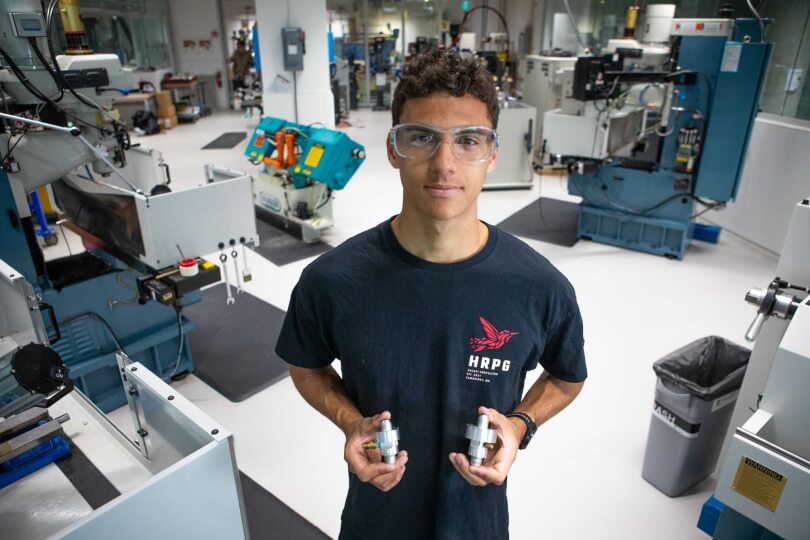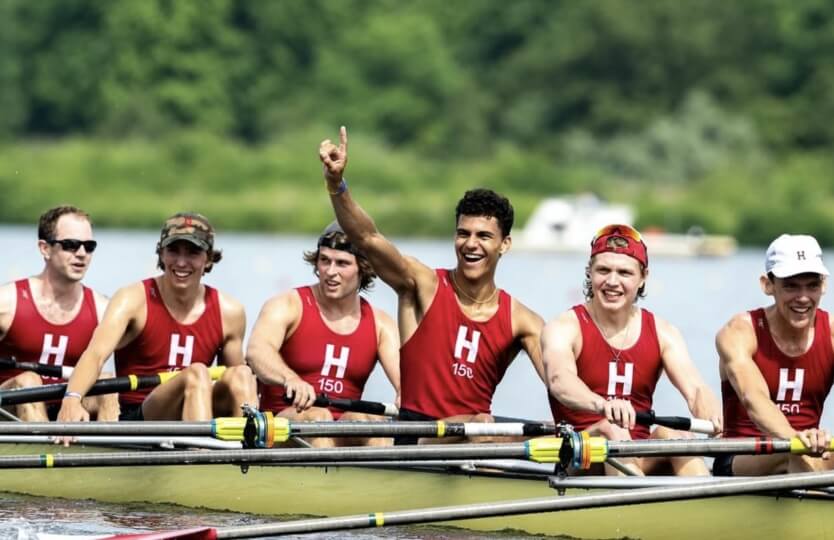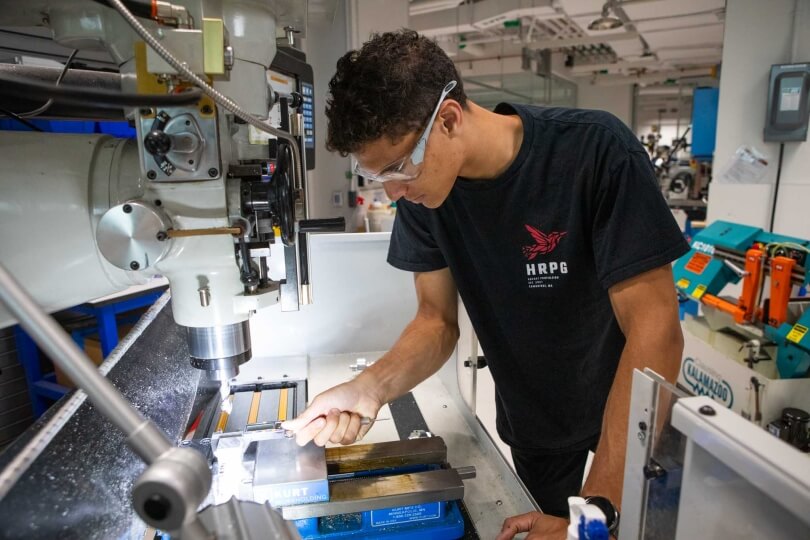Nathan Evans, S.B. '25, in mechanical engineering (Eliza Grinnell/SEAS)
Harvard’s rocketry scene barely existed when Nathan Evans arrived for his freshman year in the fall of 2021. Yes, the Harvard College Students for the Exploration and Development of Space existed, but at the time the student organization was focused entirely on building a small satellite, not rockets. The Harvard Rocket Propulsion Group (HRPG), dedicated to developing a liquid bipropellant rocket, had just formed that semester. Evans, who’d grown obsessed with the growing space industry as a senior high school student in San Francisco, wanted in.
“I showed up to the first meeting, and an upperclassman asked me if I wanted to lead the integration team,” he said. “I said yes, not knowing what integration was.”
HRPG became the foundation of every academic, extracurricular and professional choice Evans has made in his four years here. He applied all the lessons he learned as a mechanical engineering concentrator at the Harvard John A. Paulson School of Engineering and Applied Sciences (SEAS) to his work at the club, completing his S.B. degree with a senior capstone project on making amateur rocketry more affordable. He took on greater leadership roles within HRPG, including two semesters as president. He even learned about the lightweight rowing team from a fellow HRPG member who was already on the team. Despite never rowing competitively before, he walked onto the team, and last spring helped the Crimson win a national championship.
As a member of Harvard's lightweight rowing team, Nathan Evans helped the Crimson win a national championship in 2024 (Nathan Evans)
“A friend in the club one day showed up to a meeting with bandages on his hands,” Evans said. “He looked like he’d grabbed onto an oven and hadn’t let go. When I asked if he’d gotten into an accident, he said it was because of rowing. The fact that this kid was taking all the same classes as I was, doing all the same extracurriculars, and still found enough time to row until his hands bled and could be so nonchalant about it, I thought he must know something that I didn’t and had to give it a try.”
Evans’s work in HRPG even set him up for a career in aerospace engineering. Last summer, he interned for Relativity Space, an aerospace manufacturing company in California. After graduation, he’ll return to Relativity full-time as a design engineer.
“As an engineering student, it’s really the projects you take on outside of class that define your engineering experience, and they’re really a significant part of what companies will look at when you go into interviews,” said Evans, S.B. ‘25. “You don’t need the industry-specific degree to break into the industry, but the work I’ve done with my student club, especially learning how to use the Active Learning Labs machine shop, was incredibly useful.”
A desire to see another part of the country brought Evans to Harvard. Always intending to pursue aerospace engineering, when he saw Harvard didn’t have as big an aerospace club as some of the other Ivy League schools, he set out to help build it himself by joining HRPG.
“Sophomore year, the first time we were able to get that liquid bipropellant rocket engine working was a huge step,” Evans said. “Nobody at Harvard had ever done it, nobody in the Ivy League had ever done it, and we weren’t sure it could even be done. It took several tries of driving out in frigid temperatures to Minuteman Airfield in Stow, Mass., trying to produce a single pound of thrust. That was a lot of fun, and a monumental moment.”
Fellowships have also proven critical to Evans breaking into his dream industry. The Patti Grace Smith Fellowship, which helps connect Black undergraduate students with aerospace internships, allowed him to spend a summer at Ball Aerospace after his sophomore year. As a junior, he was named a Matthew Isakowitz Fellow, a program for upperclassmen looking to intern in aerospace. The following summer, he interned at Relativity, where he worked as a valves manufacturing engineer.
For his senior thesis, Nathan Evans examined the affordability of rocketry clubs manufacturing their own valves as opposed to buying off-the-shelf parts (Eliza Grinnell/SEAS)
“Valves are a very critical component of any rocket,” he said. “They’re pretty much the on-off switches that allow propellants and other fluids to flow through the rocket. Valve design is a very multidisciplinary engineering field. You have mechanical design, you have material design, you have fluid mechanics, and you have thermodynamics because these valves often deal with both cryogenic temperatures and temperatures that are half the surface of the sun. It’s really a great area to learn and develop your skills as a mechanical engineer across multiple disciplines, which is why I’m very excited.”
Evans became so fascinated with valves that they became the specific topic of his senior thesis. His advisor, Bryan Neill, is a valves engineer at Relativity that Evans met last summer. The capstone project examined the affordability of rocketry clubs manufacturing their own valves as opposed to buying off-the-shelf parts.
“No one’s born a rocket scientist,” he said. “Everybody has to start somewhere, and it generally starts with these student groups. If we can lower the cost of amateur-level rocketry, we open the doors for more students to learn these technologies, enter the industry and solve its biggest challenges.”
Throughout the application process to join Relativity, Evans said he’d often draw on knowledge gained from his mechanical engineering classes, especially those that taught him about computer-aided design and the mechanics of solid objects. The multidisciplinary approach to education at SEAS also helped him adapt and learn new skills throughout the summer, setting him up to secure a return offer for full-time employment.
Evans has already taken the rocketry community at Harvard to new heights. Once he graduates, he’ll bring that same passion to the greater aerospace industry.
“Space exploration is a great platform for developing new technology,” he said. “Every gram of mass matters when you send something into space, so it really pushes the limits of all kinds of engineering fields – mechanical engineering, computer science, materials science. Every technology that we develop to explore space helps us live better here on Earth.”
Press Contact
Matt Goisman | mgoisman@g.harvard.edu


